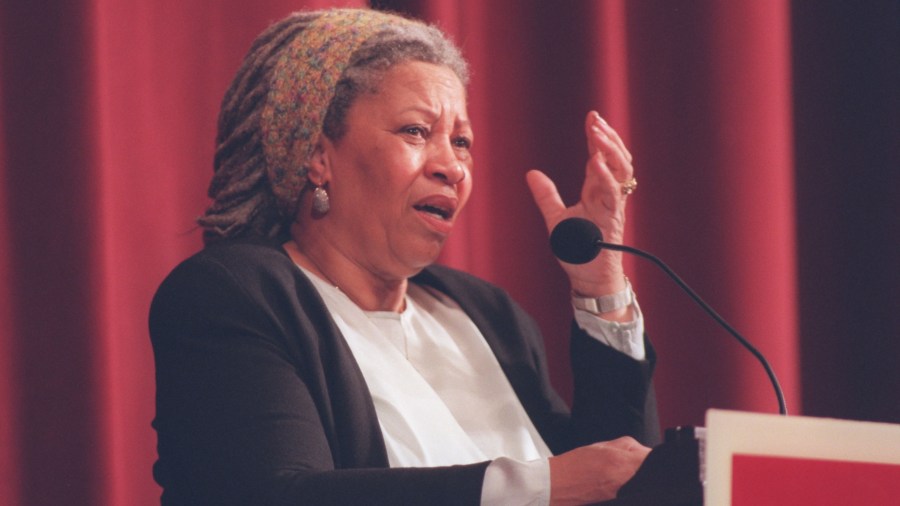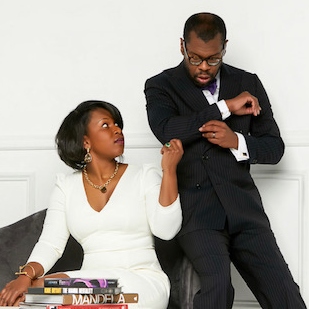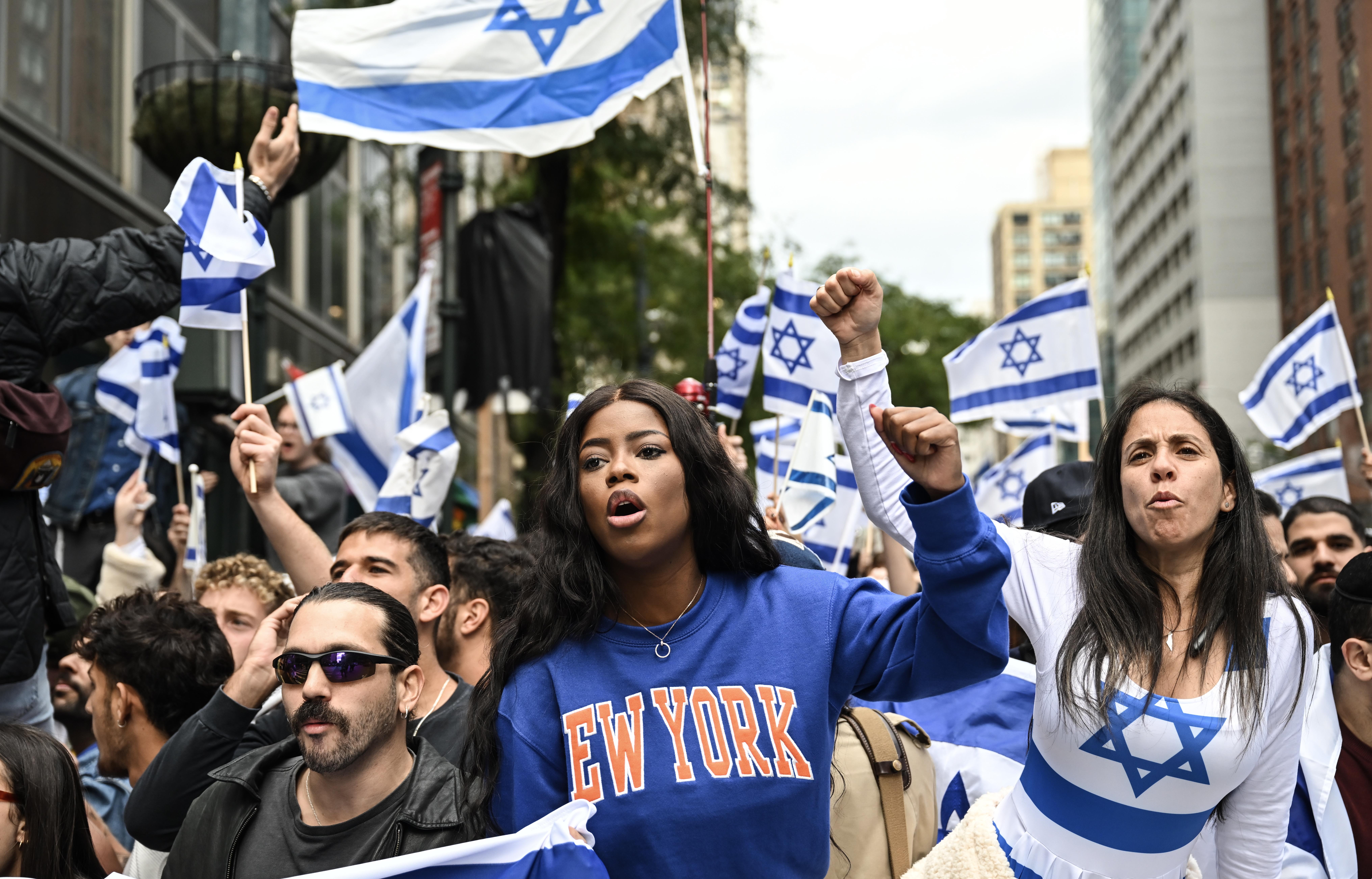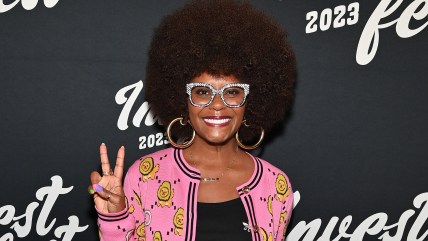More than peace: How Toni Morrison urged us to fight for something bigger than war
Amid renewed declarations of war between Israel and Palestine, Toni Morrison’s 30-year-old Novel Prize speech holds new relevance.
“Notes on faith” is theGrio’s inspirational, interdenominational series featuring Black thought leaders across faiths.
“There is a certain kind of peace that is not merely the absence of war. It is larger than that. The peace I am thinking of is not at the mercy of history’s rule, nor is it a passive surrender to the status quo. The peace I am thinking of is the dance of an open mind when it engages another equally open one—an activity that occurs most naturally, most often in the reading/writing world we live in. Accessible as it is, this particular kind of peace warrants vigilance. The peril it faces comes not from the computers and information highways that raise alarm among book readers, but from unrecognized, more sinister quarters.”
— excerpted from Toni Morrison’s 1993 Nobel Prize speech

Thirty years ago this month, Toni Morrison won the Nobel Peace Prize in Literature, only two years after the end of the Gulf War and mere days after the Battle of Mogadishu ended United States intervention in Somalia. In her pointed acceptance speech months later, Morrison urged us to consider peace and conflict differently, warning that “this particular kind of peace warrants vigilance.”
This month, the world has been thrust into chaos by a renewed declaration of war amid ongoing and now elevated hostilities between the Israeli government and the Islamic Resistance Movement, or Hamas. As too many lives are made collateral damage — men, women, and children; Palestinians and Israelis; Muslims, Jews, and Christians; Americans and other nationals — many of us are also thrust into reflection, unsettled by contrasts of values, beliefs and the idea that war is a necessary vehicle for peace.
Morrison, a sage in her time and beyond, prophetically delineated a vision of peace that transcends the superficial absence of conflict. Specifically, it was her view that the absence of conflict in itself does not shield us from potential conflict. Knowledge and ethics shaped by that knowledge do.
In our present context, her insights are not just timely but profoundly necessary, as they shepherd us towards a more vivid perception of peace that burgeons from the fertile soils of open, engaged minds.
Morrison’s peace is a dynamic, active peace — it is “the dance of an open mind.” It is not a peace that can be enforced by treaties, won by wars or maintained through a delicate balance of powers or fragile egos. Instead, this is a call to nimble responses to friction that is supported by our ongoing learning from one another. It is a peace that blossoms in the rich, expansive world of stories — of words exchanged, meditated on, mulled over, and understood; of histories shared and respected; and of human experiences interwoven through the act of telling and being told.
In the 75-year-long crucible of the Israeli-Palestinian conflict, where narratives clash, and histories intertwine in a complex tapestry, Morrison’s words resonate with poignant urgency, particularly as social media enlists us as witnesses to the erupting clash. We are all witnesses.
The stories from both sides of the divide — stories of loss, of hope, of home and of exile — demand to be acknowledged and absorbed in their full humanity. Many of us have been sought after to take a stand by posting our position about the party with which we align, falling prey to knee-jerk reactions to pick a presumed side. Consequently, our pursuit of a more stable peace seems to meander through these personal and collective narratives. The polarity of these moments pressures us to choose a side, but that isn’t the work of de-escalation and resolve. The enduring work of peacemaking is forged in the sharing of these stories in a language that resists prejudice, finding common ground in which a space for understanding and empathy is carved.
A crucial strategy is to move beyond the history books and engage the living epistles among us. Regardless of where you stand, in times like these, a robust theology considered with the intent of a common ground, the liberation of all oppressed peoples, and an embrace of humanity charges us to consider the most vulnerable among us.
What about the children offered as an unwitting sacrifice in all of this?
Social justice witness Rev. Cece Jones-Davis poignantly reminds us that our fixation on histories can get in the way of acting urgently on our core ethics as humans who care about what is truly real in the here and now:
“I’m not going to pretend to know everything there is to know about Israel, Palestine, Hamas, or the Israel Defense Force. There’s a long history that will take me (and maybe you too) months [or]years to unravel,” read a portion of an Instagram post by Jones-Davis.
“None of that is important to me today … I’m with all the hostages. I’m with all the people who are yelling in agony and crawling on their knees. I’m with every desperate parent who can’t find their child. I’m with the bodies under the rubble. I stand with all of them.”
Such witnesses call us to set the intention for fundamental reasoning and ethics between parties that is found in Isaiah 1:18, a passage hewn out of a war-torn narrative:
“Come now, let us reason together,”
says the Lord.
“Though your sins are like scarlet,
I will make them as white as snow.
Though they are red like crimson,
I will make them as white as wool.
However, achieving Morrison’s “certain kind of peace” and reasoning is neither simple nor effortless. Such valiance “warrants vigilance,” as she warns. The threats it faces are insidious, often cloaked under the guise of tradition, nationalism, or security. They lurk in the unwillingness to engage with the ‘other,’ in the dehumanizing of one’s adversaries, and in the deliberate oblivion to the suffering that bestrides the borders.
In this digital age, wars and rumors of war are preserved in the social media echo chamber that dehumanizes our experiences; discussions where narratives are often one-sided and designed to reinforce preexisting beliefs rather than to challenge, engage or expand our understanding. These platforms connect us to wider narratives, but they can also sever the fragile threads of empathy and understanding when we are not critical, careful or cautious with our words.
We can choose to share in the collective fatigue and horror, and the very real impact on citizens across the globe brought on by political unrest that is so fraught with tender histories. As faith leaders, we understand ourselves also in the contexts of being educators, activists, brothers and sisters, friends, partners, products of our parents, and perhaps one day, parents ourselves. We weep as we observe the human carnage and yearn for the day all of humanity can experience profound peace rooted in justice.
As we reflect on her trailblazing anniversary, let’s honor Morrison’s legacy by committing ourselves to the pursuit of a peace rooted in mutual understanding, respect, and empathy. We must stand firm as witnesses, engaging in difficult conversations, listening to the stories that unsettle us and writing narratives that speak truth to power. Through these acts of courage, we inch closer to the world Morrison envisioned: a world of our co-creation — one where peace is not a mere interlude between wars but a way of life, sustained by the fluid dance of minds and hearts.
Today, our prayer is for the vulnerable children.
We are all witnesses.
Creator, remind us of the children.
Align our heads and hearts for their sake, however equally impassioned our communities may be.
Open our eyes to the world we are leaving them and their kin.
Open our eyes to our ethics and our care, causing our will to agree with yours.
Help us to reason together as kin, weary of carrying our oughts.
Give us dreams of their future, filled with love, joy, peace, and protection.
Help us value our neighbor’s children as our own.
May they be our motivation to create new ways and brighter futures than what we have seen.
For our children, help us to repent for any part that would threaten their future.
Empower us to create new memories.
Give us the strength to find common ground for their sake. Amen.

Rev. Dr. Alisha Lola Jones is a faith leader helping people to find their groove in a fast-paced world, as a consultant for various arts and faith organizations and professor of music in contemporary societies at the University of Cambridge in Cambridge, England. She is an award-winning author of Flaming? The Peculiar Theopolitics of Fire and Desire in Black Male Gospel Performance (Oxford University Press). For more information, please visit DrAlisha.com.
Rev. Calvin Taylor Skinner is dedicated to empowering frontline communities in Knoxville, Tenn. and the United Kingdom. He uses Faith and Policy to address energy justice, criminal justice reform, voter education/mobilization, electoral politics, and global affairs. Along with his wife, Rev. Dr. Alisha Lola Jones, they lead InSight Initiative, a consulting firm focusing on capacity building and live events production.
TheGrio is FREE on your TV via Apple TV, Amazon Fire, Roku, and Android TV. TheGrio’s Black Podcast Network is free too. Download theGrio mobile apps today! Listen to ‘Writing Black‘ with Maiysha Kai.


